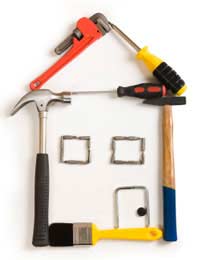Keeping on Top of DIY

Do it Yourself, or DIY is an area that most people shy away from, preferring to call in an expert. On the other end of the scale, often over-enthusiastic DIY attempts can end in disaster – needing to call in someone to put right the damage and costing twice as much as if you’d asked someone else to do the jobs in the first place.
You need to be prepared for things to fall down, fall off, break and need fixing though, so it pays to have a basic kit and a the ability to put right any little jobs that need doing around the home.
What Do You Need In A Basic DIY Kit?
- a tape measure
- hammer
- pliers
- a set of screwdrivers
- a stanley knife
- a spirit level
- one large and one small adjustable spanner
When You Have A DIY Emergency
You never know when emergency DIY is going to be needed, so it’s best to be prepared for all eventualities.Keep a spare torch by the fuse board/cupboard in your house, and keep a spare set of batteries close to it. You’ll really appreciate this when the lights go out and you can’t find anything in the dark!
Keep little spares like the bleed key for the radiators, fuse wire and a set of pliers pliers in a dedicated drawer in the kitchen, so that if something blows or needs dealing with quickly, you don’t have to hunt for your tool box in the shed or garage. Keep a selection of fuses, hooks, and a roll of insulation tape in the drawer too, as you never know when you’re likely to need one – it’s invariably when the shops are shut.
DIY Safety
DIY is one of the most common causes of accidents around the home, so before you start anything, take precautions so that your efforts don’t cause any harm to anyone, or danger within the home. If in doubt whether you can fix or build something, read up about it first, and get all the right tools in advance. Don’t take on anything too adventurous if you’re not absolutely sure you can cope...and if you don’t think you can, there’s no shame in calling in an expert – that’s what they do!Always the right safety protection – some jobs could be harmful to skin or eyes, so wear the right clothes and safety equipment:
- Gloves to protect your skin from chemicals and irritation
- Goggles to protect your eyes
- Face mask if you’re working in dusty places
- Make sure that anywhere you are working is kept well ventilated. Open all the doors and windows if you’re making a lot of dust or there are chemical fumes.
- Keep pets and children well away from where you’re working.
- The Stress of Building Work in My Home: A Case Study
- Creating Your Own Space at Home
- Home-Cooked Meals for Busy Households
- Colour Schemes to Help You Relax
- Dealing With the Household Chores
- Looking After Pets
- When Household Appliances Break
- Keep a Tidy House When You Have Kids
- Do it Yourself or Pay Someone Else?
- Choosing Your Cleaning Products
- Decorating and Interior Design


Re: Can Diet Help You Deal With Stress: Interview With a Nutritionist
Hi have had food poisoning 2 weeks ago and everything is is still going through me…
Re: Am I Entitled to Any Benefits?
I just gone down to 12 hours in work I have 8 yr old daughter am separated from my husband can I claimed any benefits
Re: Am I Entitled to Any Benefits?
Hi I work 16 hrs per week I don't get any money from anywhere else I get between £139 and £169 per week I have to pay £187 per…
Re: Am I Entitled to Any Benefits?
My wife is on an average £540 I have applied for a joint assessment but told my wife earn more than the law says we need to live…
Re: Decorating and Interior Design
The secret with painting is to take care of the woodwork first. When you come to walls and ceilings, begin with the edging,…